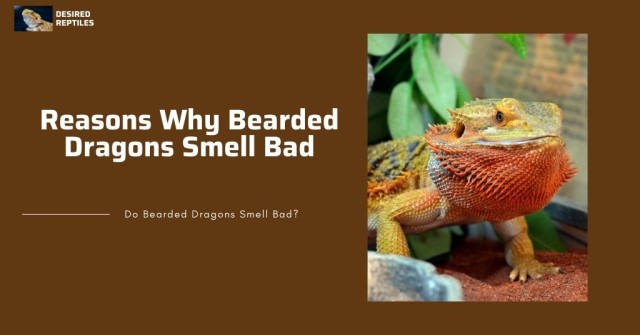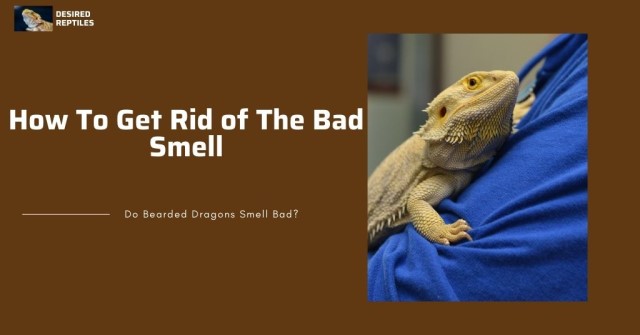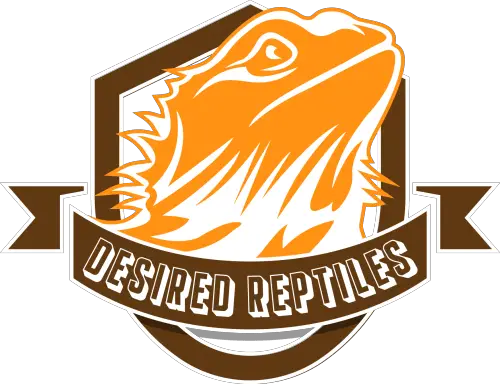Bearded dragons are highly lovable pets, no doubt. There are several perks you can enjoy by owning a reptile friend. However, keeping pets comes with somewhat unpleasant prices – the smell!
Pet owners understand the struggle of keeping their pets stink-free and some go through lengthy measures to attain such. In some cases, the battle is inevitable especially if you live in humid places. So, it’s only natural to know what your nose is up against before bringing your beardie home.
Bearded dragons do not smell bad, and are commonly perceived as neat pets. It helps that they have hairless and dry skin, so there’s little to no chance of trapping odor-causing dirt on it. Of course, bearded dragons have their natural scent, but most of the time, it’s the enclosure that would smell bad and not the dragon itself.
Are you bothered by the possible funk of keeping a bearded dragon? It’s normal to feel that way. There would certainly be some unpleasant smells, but this article will shed great light on how to manage them. Let’s start with the reasons why there’d be a smell in the first place.

Why Does My Beardie Smell So Bad? – 4 Dangerous Reasons
Bearded dragons do not need regular baths to stay fresh as we do. Their bodies are wired to reduce strong fragrances to curtail the chances of getting tracked by predators in the wild. They don’t have sebaceous glands on their skin, except for the periodontal glands.
These glands found underneath their bodies help them to release pheromones and communicate during mating periods, and these pheromones go easily undetected by you.
If your bearded dragon is smelly, here are some possible reasons why that could be happening:
1. Stale Or Rotten Food In The Enclosure
When food rots, it smells bad especially when they’re kept in tight enclosures over time. You may have forgotten a few crickets or vegetables in your dragon’s enclosure. Take a peek around and lift the items inside the enclosure to ensure that there are no leftovers in your dragon’s terrarium. If you find any, take it out immediately including your pet, and let the enclosure air for a few minutes.
2. There’s Beardie Poop Hiding Somewhere
If you’ve never kept a bearded dragon, you simply couldn’t be prepared enough for the horrific smell of their poop! The reason why beardies excrete awfully smelly poop is because of the number of bacteria and microorganisms needed to break down what they eat. Compared to your complex digestive system that is backed up by several procedures including chewing, beardies have a fairly simple system.
For them to break down the tough-bodied grubs they eat, they would require extra work from microorganisms. These organisms release sulfur compounds that would throw punches to your nose when you pass by. So, don’t be surprised by your beardie’s smelly poop!
3. The Enclosure Itself Has Gone Stale
It’s difficult to wipe a smell off of glass, and even much more difficult if your dragon’s enclosure is made of wood. You already know how stubborn the smell of your pet’s poop is. If you simply pick the poop up without wiping the stained surface, or you forget to clean the tank frequently, the tank will reek! It’s important to practice proper hygiene with your beardie’s enclosure so that you can combat the possibility of a lingering odor.
4. Your Bearded Dragon May Be Sick
Digestive and respiratory problems are the major smell-causing illnesses your beardie could have. Respiratory illnesses are mucus-inducing, and where there’s phlegm, bacteria will thrive.
Pneumonia is a vivid example of respiratory disease in bearded dragons, and it includes the lungs filling with fluid resulting in oral and nasal secretions that, by all means, will smell bad.
Here are the detectable symptoms of respiratory disease in bearded dragons:
- An unrequited smell
- Lethargy
- Heavy breathing
- Pointing of the nose upward
- Discharge from the nose
- Loss of appetite
- Dehydration
Digestive illness is another avenue for unpleasant odors caused by irregular bowels or a buildup of gasses. If your beard is constipated, it will have worse-smelling poop than usual. Here are the symptoms of a digestive illness in bearded dragons:
- Regurgitation
- Lethargy
- Diarrhea
- Bloating
- Loss of appetite
- Constipation
If you notice a new weird smell coming from your beardie alongside these symptoms, go to the veterinary doctor immediately for evaluation and treatment so that the situation is contained.

4 Useful Tips To Get Rid Of That Lingering Beardie Smell
There are safe ways to manage the unfavorable smell coming from your bearded dragon’s enclosure. Here are 4 effective methods you can try:
Practice Good Hygiene
Good hygiene is crucial for keeping your beardie healthy and its enclosure stench-free. If you fail to clean your dragon’s tank as needed, your pet will fall sick due to the bacteria and fungi that will thrive in the dirty environment.
Here’s a good bearded dragon tank cleaning routine that you can use:
Daily Beardie Hygiene
The daily hygiene includes removing your beardie’s poop from the enclosure and wiping the soiled surfaces with a reptile-safe cleaning agent (view on Amazon) and disinfecting with a safe disinfectant.
Weekly Beardie Hygiene
Ensure that you replace the substrate with a new fresh one especially if you’re using newspapers. If you’re using a carpet, guarantee that you remove and scrub it clean weekly before reusing it.
Monthly Beardie Hygiene
At the end of every month, you must wipe every inch of the tank clean with a reptile-safe cleaning agent; on all sides of the tank, the bottom, and the roof. Every decoration with a wipeable surface should be as well cleaned before it is replaced. If the items are heavily textured with grooves, use a toothbrush to get between the cracks.
Use An Easy-Maintenance Substrate
The substrate is a big determinant of hygiene. Every mess your dragon makes and every “present” it leaves behind can be managed depending on the substrate your bearded dragon has in its tank. Choose flooring types that you can easily maintain like plastic carpets, newspapers, and paper towels. An even better option is tiling so that you can easily wipe off the poop and sanitize the area.
Feed Your Bearded Dragon A Healthy Diet
Your beardie will poop what it eats and be as healthy as the diet it is placed on. If your dragon is eating too much protein, its poop will be highly concentrated, and thus, smelly.
Here’s a brief description of what your beardie’s diet should be depending on its age:
| Age (months) | Fraction in Percent (Bugs & Veggies) | Number of Insects |
|---|---|---|
| 0 to 2 (Baby dragon) | 70/30 | 25 – 50/day |
| 3 to 6 (Juvenile) | 70/30 | 25 – 50/day |
| 6 to 9 (Pre-Adult) | 60/40 | 20/day |
| 18+ (Adult) | 30/70 | 10/day |
Ensure That Your Pet Is Hydrated
Hydration is necessary to keep the body healthy and effective. It also plays a huge role in digestion and excretion. If your bearded dragon is dehydrated, it may contract a digestive illness that is both unpleasantly smelling and dangerous to your bearded dragon.
Can I Spray Perfume In My Beardie’s Tank?
Spraying any sort of chemical fragrances inside your bearded dragon’s tank is highly dangerous. It could affect its eyes and cause a chronic respiratory infection. This is why it’s important to only use reptile-safe products or homemade solutions like water and vinegar to clean your beardie’s tank.
Do not spray perfume in your bearded dragon’s tank. Instead, you can use a reptile deodorizer (view on Amazon) to get the funk out – it’s a much safer and healthier option. Just don’t use it excessively; too much of everything is bad for your pet.
